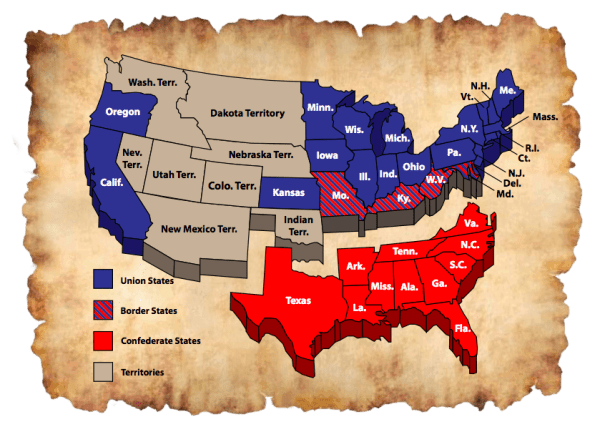The Confederate States of America — commonly referred to as the Confederacy — was an unrecognized republic in North America that existed from 1861 to 1865. Many historians have said their secession from the United States was an illegal act of war, but others say the right was clearly stated in the U.S. Constitution.
Confederate States of America: The Question of Secession
The question is whether the Southern states possessed the legal right to secede. Some argue they did. Jefferson Davis, president of the new Confederate States of America, argued that the legal basis for secession could be found in the Tenth Amendment to the Constitution. That amendment had said that any power not delegated to the federal government by the states, and not prohibited to the states by the Constitution, remained a right of the states or the people. The Constitution is silent on the question of secession. And the states never delegated to the federal government any power to suppress secession. Therefore, secession remained a reserved right of the states. This was partly why James Buchanan, Lincoln’s predecessor in the White House, had allowed the first seven Southern states to leave in peace. Although he did not believe they possessed a right of secession, he also did not believe that the federal government had the right to coerce a seceding state. This was an interesting question up for debate regarding the Confederate States of America.
“The Confederacy Dominated the Early Civil War. So Why Did It Ultimately Lose?”
For the full “History Unplugged” podcast, click here!
Another argument in support of the right of secession involves the states of Virginia, New York, and Rhode Island. Readers may recall that those states included in a clause in their ratifications of the Constitution that permitted them to withdraw from the Union if the new government should become oppressive. It was on this basis that they acceded to the Union. Virginia cited this provision of its ratification when seceding in 1861. But since the Constitution is also based on the principle of coequality—all the states are equal in dignity and rights, and no state can have more rights than another—the right of secession cited by these three states must extend equally to all the states. This is a powerful argument about the Confederate States of America that has been taken seriously by many historians.
This article is part of our larger selection of posts about the Civil War. To learn more, click here for our comprehensive guide to the Civil War.
Additional Resources About Revolution and Colonies
Cite This Article
"Confederate States of America and the Legal Right To Secede" History on the Net© 2000-2024, Salem Media.
April 24, 2024 <https://www.historyonthenet.com/confederate-states-america-2>
More Citation Information.

